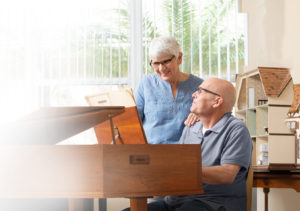
This post was developed in collaboration with Lundbeck.
Gail had symptoms of dizziness, lightheadedness and nausea for most of her adult life, but had trouble articulating them to her doctor.
“It felt like a black cloud was following me. I would experience extreme dizziness and nausea after I stood up, and it felt like I was going to black out. When I would talk to my doctors about what I was experiencing, they would say it was because of my thyroid or that I needed a B12 shot.”
Gail’s health issues also affected her career.
“Before I retired, I was an elementary school music teacher and the symptoms I was experiencing greatly impacted my life. I started to hide my symptoms at work by spending most of my day sitting. The symptoms were making my world smaller and smaller. I started staying in my house more and avoided driving as much as I could.”
Gail was finally diagnosed with Parkinson’s disease in 1999. She figured the reason why she had been experiencing the symptoms of dizziness, nausea, and the feeling like she was going to black out for all of those years was because of her undiagnosed Parkinson’s disease, but she came to find out that wasn’t the case. “After I retired and moved to Florida in 2000, I had to find a new neurologist. At one of my appointments, I mentioned my symptoms which prompted him to take my blood pressure readings in
different positions, including both sitting and standing, whereas my previous specialist would only take them while I was sitting down.”
It was after this appointment that she learned that the symptoms she had been experiencing all of her adult life weren’t typical for everyone with Parkinson’s.
“Ten years after my Parkinson’s diagnosis, my neurologist told me I had symptomatic neurogenic orthostatic hypotension, or nOH. I felt total relief when I found out that my symptoms were not from my Parkinson’s, but from a separate condition that is associated with neurodegenerative conditions, like Parkinson’s. The best news of all was when he told me that the symptoms could be managed.”
Gail’s neurologist informed her that there was a clinical trial starting for a drug called NORTHERA® (droxidopa) and he thought she would be a good candidate for it. “I was glad to know there was something I could try, to see if it would help manage my symptoms. I decided to participate in the clinical trial and fortunately for me, taking NORTHERA has helped relieve my symptoms, though NORTHERA might not work the same for everyone.” Please review the full Use for Northera and Important Safety Information below, including a boxed warning for Supine Hypertension.
Gail was so motivated to help others advocate for themselves that she decided to become an nOH Champion. nOH Champions are a network of patients and care partner ambassadors dedicated to educating and supporting others living with or caring for someone who has nOH. As an nOH Champion, Gail has the opportunity to share her story and raise awareness of this lesser-known condition, while empowering others at various stages of their journey. The nOH Champion program is a national program and is sponsored by Lundbeck, the manufacturer of NORTHERA.
“When people think about Parkinson’s, they tend to focus on the motor aspects of the disease, including tremors, loss of balance or difficulty moving. I wanted to share my story to encourage others who might be living with Parkinson’s disease or other neurodegenerative diseases to talk to their doctor if they are experiencing symptoms like I was. There may be a way to treat these symptoms, you just need to ask the right questions.”

To learn more about nOH and how NORTHERA® helps treats it, Salima Brillman, MD, Neurologist and Movement Disorder Specialist from the Parkinson’s Disease and Movement Disorders Center of Silicon Valley, provides the following information:
What is nOH?
“Neurogenic orthostatic hypotension is a lesser-known condition that can be associated with several neurodegenerative diseases, like Parkinson’s disease, multiple system atrophy and pure autonomic failure. It’s due in large part to
the fact that the body does not release enough norepinephrine upon standing. As a result, blood vessels are unable to tighten as they should, preventing the blood from circulating back up to the heart and brain. This deficiency is what causes symptoms like lightheadedness, dizziness or the feeling of blacking out, among other symptoms.”
How prevalent is nOH in people with neurodegenerative conditions?
“Symptomatic nOH can present itself in about 20% of people living with Parkinson’s disease, 80% of people living with multiple system atrophy and nearly 100% of people with pure autonomic failure. Like Gail, many people don’t realize they are living with this manageable condition, which is why it’s so important to raise awareness of it.”
How is nOH diagnosed?
“As Gail mentioned, one way that nOH can be diagnosed is by a physician taking blood pressure readings while standing and sitting or during a tilt-table test, along with monitoring heart rate. If there is a sustained drop in blood pressure without an increase in heart rate, it’s suggested that the symptoms are from nOH.”
What is NORTHERA and how does it work?
“NORTHERA is a prescription medication that has been shown to improve symptoms of dizziness, lightheadedness and the feeling of blacking out. It is the only FDA-approved treatment specifically studied in patients with symptomatic nOH. The exact way it works is unknown, but it has been shown to have a small and temporary increase in norepinephrine. It’s important to talk with your doctor before starting or stopping any medications. Your healthcare provider should always be your first source of information and care.”
USE OF NORTHERA (droxidopa) CAPSULES (100 mg, 200 mg, 300 mg)
NORTHERA (droxidopa) is a prescription medication used to reduce dizziness, lightheadedness, or the “feeling that you are about to black out” in adults who experience a significant drop in blood pressure when changing positions or standing (called symptomatic neurogenic orthostatic hypotension (nOH)) and who have one of the following:
— Parkinson’s disease (PD), a neurodegenerative disease that causes slowness in muscle movement as well as shaking in the hands
— Multiple system atrophy (MSA), a Parkinson’s-like disorder with more widespread effects on the brain and body
— Pure autonomic failure (PAF), a neurodegenerative disease that results in frequent drops in blood pressure upon standing
— Dopamine beta-hydroxylase deficiency, a condition where the body cannot make enough of the hormones that help regulate blood pressure
— Non-diabetic autonomic neuropathy, an inability to maintain blood pressure upon standing that can be caused by a number of rare diseases
Effectiveness beyond 2 weeks of treatment has not been established, and your doctor will decide if you should continue taking NORTHERA.
IMPORTANT SAFETY INFORMATION
When lying down, elevating the head and upper body lowers the risk of high blood pressure. Check your blood pressure in this position prior to starting and during NORTHERA treatment. If you experience high blood pressure, talk to your doctor about your NORTHERA treatment.
• Do not take NORTHERA if you have a known allergy to NORTHERA or its ingredients.
• NORTHERA may cause high blood pressure when lying down, which could lead to strokes, heart attacks, and death. To reduce this risk of supine hypertension, take your late afternoon dose of NORTHERA at least 3 hours before going to bed.
• Neuroleptic malignant syndrome (NMS) is a rare but potentially life-threatening side effect reported with NORTHERA. Call your doctor right away and go to the nearest emergency room if you develop these signs and symptoms: high fever, stiff muscles, movements that you cannot control, confusion or problems thinking, very fast or uneven heartbeats, or increased sweating. NORTHERA should be stopped immediately if NMS is diagnosed.
• If you have coronary artery disease, irregular heartbeat, or heart failure, NORTHERA may worsen the symptoms of these disorders. Call your doctor if your symptoms become worse.
• NORTHERA may cause allergic reactions. Stop taking NORTHERA and contact your doctor right away, or go to the nearest emergency room if you experience any signs or symptoms of an allergic reaction such as: fast heartbeat, nausea, vomiting, swelling, trouble breathing, hives, or rash. NORTHERA contains tartrazine (FD&C Yellow No. 5), which may also cause an allergic reaction, especially if you have had a reaction to aspirin.
• The most common side effects with NORTHERA are headache, dizziness, nausea, and high blood pressure.
• Taking NORTHERA with other medications may cause side effects. Tell your doctor if you take prescription or over-the-counter medicines, vitamins, or herbal supplements.
• You should not breastfeed during treatment with NORTHERA.
• If you plan to become or are currently pregnant, talk to your doctor as it is not known if NORTHERA could harm your unborn baby.
• Take NORTHERA the same way each time, either with or without food.
• If you miss a dose of NORTHERA, take your next dose at the regularly scheduled time. Do not double the dose.
For more information, please see the full Prescribing Information, including Boxed Warning for supine hypertension, or go to www.NORTHERA.com.
You are encouraged to report negative side effects of prescription drugs to the FDA. Visit www.fda.gov/medwatch or call 1-800-FDA-1088.
©2020 Lundbeck. All rights reserved. NORTHERA is a registered trademark of Lundbeck NA. Ltd. DRX-B-100390
